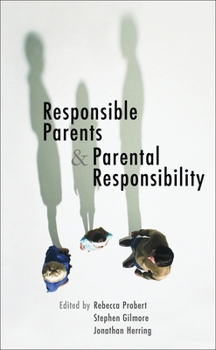Responsible Parents and Parental Responsibility
This book examines the idea of 'parental responsibility' in English law and what is expected of a responsible parent. The scope of 'parental responsibility', a key concept in family law, is undefined and often ambiguous. Yet, to date, more attention has been paid to how individuals acquire parental responsibility than to the question of the rights, powers, duties and responsibilities they have once they obtain it. This book redresses the balance by providing the first sustained examination of the different elements of parental responsibility, bringing together leading scholars to comment on specific aspects of its operation.
The book begins by exploring the conceptual underpinnings of parental responsibility in the context of parents' and children's rights. The analysis highlights the inherent constraints and limitations of 'parental responsibility' and how its scope has deliberately been curtailed in certain contexts. The book then considers what parental responsibility allows and requires in specific areas, for example, naming a child, education, religious upbringing, medical treatment, corporal punishment, dealing with any contracts entered into or property owned by the child, representing the child in legal proceedings, consenting to a child's marriage or civil partnership and the law's response to the death of a child. In the final section, the idea of the 'responsible parent' is considered in the contexts of child support, contact, tort, and criminal law.Format:Paperback
Language:English
ISBN:1841138800
ISBN13:9781841138800
Release Date:April 2009
Publisher:Hart Publishing
Length:366 Pages
Weight:1.14 lbs.
Dimensions:0.8" x 6.1" x 9.2"
Related Subjects
LawCustomer Reviews
0 rating





